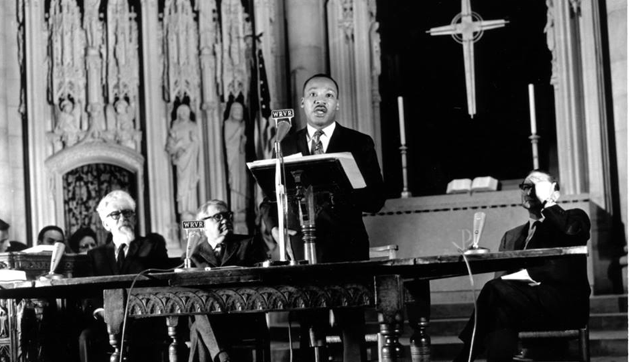MLK: Waging Wars Abroad is Inconsistent with Insisting on Non-Violent Protest

Martin Luther King:
As I have walked among the desperate, rejected, and angry young men, I have told them that Molotov cocktails and rifles would not solve their problems. I have tried to offer them my deepest compassion while maintaining my conviction that social change comes most meaningfully through nonviolent action. But they ask — and rightly so — what about Vietnam? They ask if our own nation wasn’t using massive doses of violence to solve its problems, to bring about the changes it wanted. Their questions hit home, and I knew that I could never again raise my voice against the violence of the oppressed in the ghettos without having first spoken clearly to the greatest purveyor of violence in the world today — my own government. For the sake of those boys, for the sake of this government, for the sake of the hundreds of thousands trembling under our violence, I cannot be silent.
"Beyond Vietnam: A Time to Break Silence," given at Riverside Church in New York City on April 4, 1967.
Bill Maher Un-Baptizes Mitt Romney’s Father-in-Law
In addition to conducting an un-baptism of Mitt Romney's father in law, Maher also has a retort for those who think Atheism is a "religion":
"Atheism is a religion like abstinence is a sex position."
Inconvenient Discrimination Against People from Asia
As reported by Renu Mukherjee at City Journal, "Inconvenient Discrimination: The American Psychological Association once acknowledged bias against Asian Americans in college admissions; today, it would rather not."
In 2012, the American Psychological Association (APA) published an online essay about discrimination against Asian Americans in college admissions. Penned by a psychology graduate student named Yi-Chen (Jenny) Wu, the essay argued that such discrimination might make American teenagers of Asian origin hesitant to identify as such and thereby negatively affect their racial and ethnic identity development and mental health. At the time, the APA described the subject of Wu’s essay as a “relevant psychosocial and psychological health and well-being topic.”
A decade later, the organization no longer believes this.
Bad Leakers and Good Leaks.
A recent document leak on Discord shows that the U.S government is lying to Americans. The contents of this leak make it clear that U.S. troops are already on the ground in Ukraine, a situation that dramatically increases the risk of direct confrontation of the U.S. and Russia, which could be cataclysmic given the current situation, already hair-trigger dangerous. The U.S. corporate news is refusing to discuss the new revelations, both the White House dishonesty and the danger on the ground in Ukraine. Why? It's entire predictable.
When the corporate news media likes the content of a leak, they don't give a rat's ass about who leaked it. On other occasions, the corporate news media finds the leak content inconvenient, in which case they zero in, laser-like, to destroy the reputation of the leaker, harping on the illegality of the leak and simultaneously suppressing the content of the leak. This protocol is in their standard playbook, as discussed by Glenn Greenwald in "The Same Establishment Playbook is Used to Malign the Character of Leakers and Distract Attention From the Substance of the Revelations."
On a virtually daily basis, one can find authorized leaks in The New York Times, The Washington Post, on CNN and NBC News: meaning stories dressed up as leaks from anonymous sources that are, in fact, nothing more than messaging assertions that the CIA, FBI, Homeland Security and the Pentagon have instructed these subservient media corporations to disseminate. When that happens, the leaker is never found or punished: even when the leaks are designated as the most serious crimes under the U.S. criminal code, such as when The Washington Post's long-time CIA spokesman David Ignatius in early 2017 published the contents of the intercepted phone calls between Trump's incoming National Security Advisor Michael Flynn and Russian Ambassador Sergey Kislyak. Most of Russiagate was constructed based on authorized leaks, a generous way of describing official propaganda from the U.S. Security State laundered in the American corporate press.
But when it comes to unauthorized leaks -- which result in the disclosure of secret evidence showing that the U.S. Security State lied, acted corruptly, or broke laws -- that is when the full weight of establishment power comes crashing down on the head of the leaker. They are found and arrested. Their character is destroyed. And now -- in a new and genuinely shocking escalation -- it is the largest media corporations themselves, such as the Times and the Post, that actually do the FBI's work by hunting down the leaker, exposing him, and ensuring his arrest.
This playback is always used in such cases and is easily recognized. The point is to shift attention from the substance of the embarrassing and incriminating disclosures onto the personal traits of the person who exposed them, so as to make the public forget about what they learned and come to see the leaker as so unlikeable that they want nothing to do with the disclosures themselves.
Glenn's System Update Episode #70 further explores the media's treatment of the Discord leaker.
- Go to the previous page
- 1
- …
- 172
- 173
- 174
- 175
- 176
- 177
- 178
- …
- 2,019
- Go to the next page

